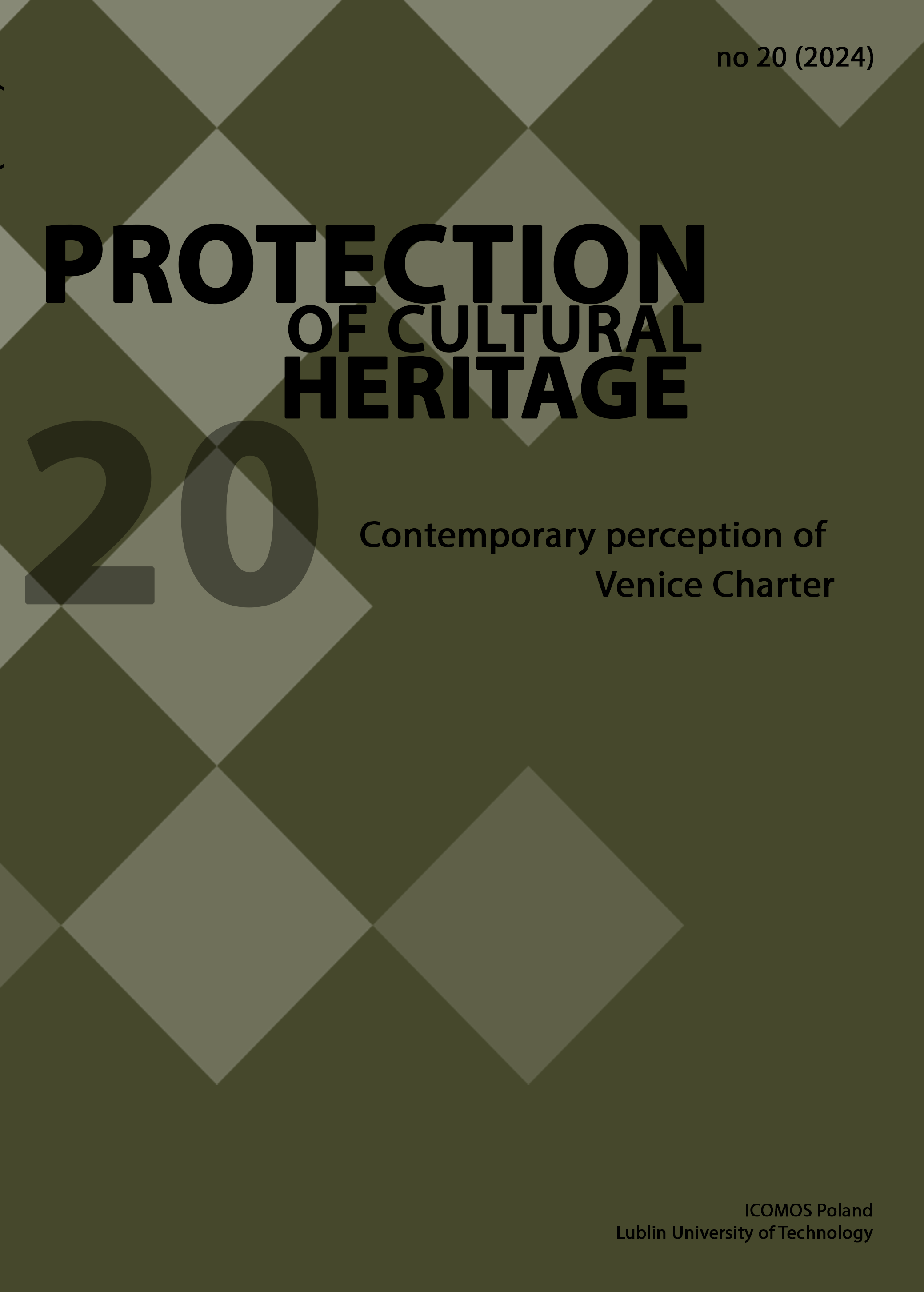The Venice Charter – between protection and socially useful purpose. Examples of World Heritage Cities in Germany and Poland
Article Sidebar
Issue No. 20 (2024)
-
Venice at 60: Article 5 and the acceptable limits of use
Nigel Walter1-19
-
The Venice Charter – between protection and socially useful purpose.
Examples of World Heritage Cities in Germany and PolandIuliia Eremenko, Tymoteusz Kraski21-31 -
The legacy of Erich Mendelsohn – expression and context in the architecture of Modern Movement.
The way to the UNESCO World Heritage ListMaria Jolanta Sołtysik33-48 -
The Venice Charter – the foundation of heritage protection or the burden of the past? An answer through the Greek experience
Dimitrios Zygomalas49-68
-
New uses of castles owned by municipalities in the province of Alicante (Spain) during the first quarter of the 21st century
Juan Antonio Mira Rico69-91
-
The Venice Charter in the age of climate change
Tino Mager93-102
-
From monuments to living heritage. Revisiting the Venice Charter in the conservation of younger industrial heritage
Alberte Klysner Steffensen103-121
Main Article Content
DOI
Authors
Abstract
The principles of the Venice Charter are still invoked worldwide as a crucial reference point in discussions and practices related to heritage preservation. However, the Charter’s lack of clarity in defining stakeholders and procedural steps raises significant issues about who has the authority to determine the appropriateness of new functions for monuments. This deficiency can lead to decision-making that might not fully consider the diverse cultural values and historical significance of the sites, potentially resulting in conservation outcomes that are more economically than socially driven. This paper examines how national and international conservation policies have expanded upon the Venice Charter to address social participation and the concept of "socially useful purposes" in World Heritage site management. Focusing on Germany and Poland World Heritage cities, the study explores how national and international guidelines have expanded upon the Venice Charter to incorporate social participation and the concept of "socially useful purposes" in the management of World Heritage sites. It delves into the role of Site Management Plans as dynamic documents that have evolved from strict preservation frameworks to policies encompassing social participation, thereby enhancing community engagement and meeting a broader spectrum of conservation needs and stakeholder interests.
Keywords:
References
Alberth, P. (Ed.). (2019). Management Plan for the UNESCO World Heritage Site "Town of Bamberg". City of Bamberg World Heritage Office.
City of Toruń, 2023, "Revitalisation Plan."
City of Toruń, 2024, "Draft UNESCO site management plan."
ICOMOS (1964). International Charter for the Conservation and Restoration of Monuments and Sites. Venice, Italy. https://www.icomos.org/charters/venice_e.pdf (date of access 29.04.2024).
Kloos, M., & Alberth, P. (2017). The Case Study of the Town of Bamberg (Germany) Concerning the Combination of Management Plans with Participation Strategies in Urban World Heritage Properties. In Aspects of Management Planning for Cultural World Heritage Sites: Principles, Approaches and Practices (pp. 209-223). Cham: Springer International Publishing. DOI: https://doi.org/10.1007/978-3-319-69856-4_16
Park, S. (2012) Precautions for heritage to be a driver for regional development: A critical review of related principles manifested in the ICOMOS charters from a development perspective. In: ICOMOS 17th General Assembly, 2011-11-27 / 2011-12-02, Paris, France.
Polish UNESCO Committe, Plan zarządzania obiektem Światowego Dziedzictwa, https://www.unesco.pl/kultura/dziedzictwo-kulturowe/swiatowe-dziedzictwo/procedura-wpisu/plan-zarzadzania/ (date of access 29.04.2024).
Przywojska, J. (2018). Revitalisation Committee–a Form of the Co-management of the Revitalisation Process on the Example of the City of Łódź. Przedsiębiorczość i Zarządzanie, 19(3.3), 15-26. DOI: 10.34768/rl.2019.v452.02. DOI: https://doi.org/10.34768/rl.2019.v452.02
Ringbeck, B. (2008). Management plans for world heritage sites. A practical guide. German Commission for UNESCO, Bonn.
Ripp, M., & Rodwell, D. (2018). Governance in UNESCO world heritage sites: Reframing the role of management plans as a tool to improve community engagement. Aspects of Management Planning for Cultural World Heritage Sites: Principles, Approaches and Practices, 241-253. DOI: https://doi.org/10.1007/978-3-319-69856-4_18
Szmygin, B., Fortuna-Marek, A., & Siwek, A. (2018). Stare miasto w Zamościu : dobro światowego dziedzictwa UNESCO : ocena wartości i plan zarządzania. https://ruj.uj.edu.pl/xmlui/handle/item/69145 (date of access 29.04.2024).
The Revitalisation Act of 9 October 2015, Journal of Laws of the Republic of Poland for the year 2015, law number 1777.
UNESCO World Heritage Centre (2023). Operational Guidelines for the Implementation of the World Heritage Convention; WHC.23/01 24 September 2023, UNESCO: Paris, France.
Article Details
Abstract views: 384
Iuliia Eremenko, University of Warsaw
Dr Iuliia Eremenko is an Assistant Professor at the Faculty of Political Science and International Studies at the University of Warsaw. She is a Principal Investigator of the “Local Experts in Polish and German World Heritage Cities: Understanding their Role in Polycentric Governance of Heritage Sites” research project.
Tymoteusz Kraski, University of Warsaw
Tymoteusz Kraski is a doctoral candidate at the Doctoral School of Social Sciences at the University of Warsaw. He is a PhD scholar in the “Local Experts in Polish and German World Heritage Cities: Understanding their Role in Polycentric Governance of Heritage Sites” research project at the University of Warsaw.







